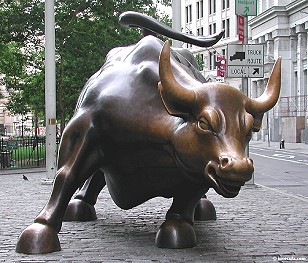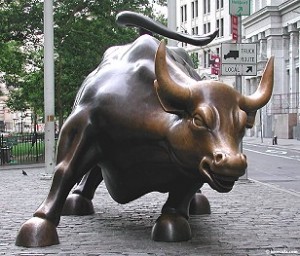Fallen Humanity and Wall Street: Disasters of “When” not “If” – By Fred Johnson
Over the last decade, nature has demonstrated the foolishness of underestimating its power to alter, sometimes with finality, the lives of human beings. The 2004 Indonesian tsunami, the 2005 cataclysm of Hurricane Katrina, and the 2010 earthquake devastation in Haiti underscore the deadly possibilities awaiting those who too easily dismiss the unpredictable power of nature. The same could be said of the current global economic crisis caused by those human beings who, as fallen children of Adam and Eve, are naturally equipped to inflict onto other people’s lives financial tsunamis, hurricanes, and earthquakes. Deterring such disasters does not require analyzing the structural causes of events but rather examining the character, motives, practices, and integrity of the people operating within those systems.
In the book the Moral Measure of the Economy, authors Chuck Collins and Mary Wright observe that, “many pretend that somehow the economy exists outside of human values and judgments. State budgets, laws governing trade, tax policy – all are deeply infused with value judgments and decisions. The question is what values are these moral judgments based on?” This is a compelling question, and the contemporary ethos of many in the corporate world suggests that much of the private sector is not preoccupied with Jesus’ admonition to relieve the hardship and suffering of the poor and struggling. Collins’ and Wright’s inquiry reasserts its relevance each time the United States gets ensnared in an economic crisis that stems as much from the natural failings of humanity as the vagaries of market “forces”. The manmade natural disaster of the current economic crisis has revived dormant discussions concerning personal and national values regarding wealth, quality of life, poverty, hunger, homelessness, and justice. This is similar to the remorseful hand-wringing that took place in the late 1980s and early 1990s as working people, once more, cleaned up the destruction caused by corporate titans whose shrugged off the swelling ranks of the unemployed and desperate. In Oliver Stone’s 1987 film Wall Street, Michael Douglas’s character, corporate raider and financier Gordon Gekko, articulated a perspective that adequately summed up that decade’s mood in corporate America: “Greed is good. Greed is right. Greed works. Greed clarifies . . . . Greed in all of its forms . . . has marked the upward surge of mankind, and greed” will save that “malfunctioning corporation called the USA.” The list of non-fictional modern pirates who have placed the lives and livelihoods of millions of citizens at risk for the expanded lavish living of a few, makes it imperative that the body of Christ be vigorous and vocal in condemning the values of a society that seemingly condones, and too often rewards, such behavior.
The Church of Christ on Earth is the one agency with the tool – the Word of God – to overcome what sci-fi writer Bruce Sterling’s observation regarding people’s “marvelous facility for ignoring other people’s pain.” It is not good enough to be outraged by the misery which results from humanity’s natural ability to produce such misfortune. Christ’s second greatest commandment to “love your neighbor as yourself” contains all of the guidance necessary for moving with swift intent and energy to ensure the fulfillment of his words. The money-changers of the early 21st century, the rich young rulers who value things over people, and the legions of us who daily dismiss our neighbors in need, we’re all part of the same wounded spirituality that permits and perpetuates our multiple miseries.
In the aftermath of 1980s insider stock trading disasters, the 1987 Savings & Loan scandal, the burst bubble of the 1990s “dot com” boom, the financial bloodletting of Enron, the egregious criminality of World Com and Tyco, and the early 21st century’s new cast of corrupt characters the Church, along with the rest of society, has routinely found itself in the position of patching up public trust and tending to the casualties of financial folly. These natural disasters by human hands cry for a response from the Church in carrying out its assigned role as caretaker of humanity until Christ returns. That assignment, however, also includes issuing strong challenges to the money-changers who endanger the operational functioning of the temple and who repeatedly heap hardships onto God’s people. The money-changers’ naturally fallen nature which leads them to destroy financial lives must be confronted by the supernatural power of Christ’s Church to challenge them and the nation regarding socioeconomic and political priorities. It is Christ’s Church that must declare in clear, bold language that humanity has not been released from obligations Jesus handed down to look after the least of those among us.
The current crisis underscores that there is much work to do. There is vast room for the Church to challenge the instigators of economic Armageddon who themselves are often left unscathed. It emphasizes a chilling encounter once articulated by Dr. Martin Luther King Jr. should the Church be satisfied with merely cleaning up these naturally occurring manmade crises: “One day we will have to stand before the God of history, and we will talk in terms of things we’ve done. It seems that I can hear the God of history saying ‘That was not enough. For I was hungry, and you fed me not.’”
The Church has been stellar in its responses to the miseries unleashed by tsunamis, hurricanes, and earthquakes. Little discussion or justification was needed to gather consensus about taking swift action to relieve human suffering. God’s will operating through the magnificence of the people in His Church proved, and continues to prove, His ability to overcome the worst earth-originating natural disasters. Clearly, when the need exists and urgency permits no delay, the Church with its centuries old pattern of compassionate response (most likely as “Christ would have”) is at the forefront of efforts to mitigate the chaos. The Church could, and needs to be, just as swift, efficient, and intent upon providing hope and relief to those who are victimized by the natural disasters of human frailty and folly. This is especially true when it comes to the economy. The Church should be the chief magistrate standing between those who have so little and those who seek to possess more than makes sense. The tsunamis, hurricanes, and earthquakes roiling in the human spirit are the kind of natural disasters the Church is well-equipped to handle and resolve. Whether or not those challenges willl be handled and resolved depends upon the ability of people in the Church to transcend the failed legacy of the Garden with the victory of Christ on the Cross.



Amen, Brother Johnson! Part of the difference with the human greed-made disasters is that they actually require courage on the part of preachers. It takes no courage to say that we have to help the victims of natural disasters. But it does take courage to say that the human-made disasters were not just occasions of suffering but occasions of sin, of evil, of the reign of the god of this world in rebellion against the true God of heaven and earth.
Thanks for bringing that courage, Prof. Johnson!
Thanks, Fred, for this reflection. It occurs to me that there are a lot of similiarities between your insights on man-made disasters and those called “natural” disasters. In that the number of “natural” disasters is predicted by climatologists and meteorologists to rise in coming years due to global warming, in fact, to talk about natural disasters creates a bit of a mistaken impression. If there are more floods, hurricanes, mudslides, duststorms, etc., because of human impact, there are only human-caused disasters.
What do you think?
It is exciting to think of the forces of faith love mobilizing to heal the destructions of Mother nature rather than finding more ways to exploit the ravages of human harm called war.